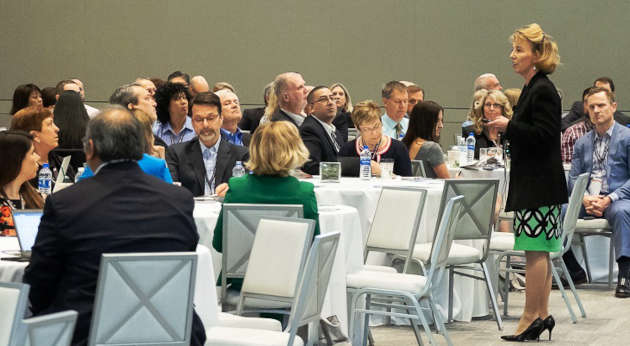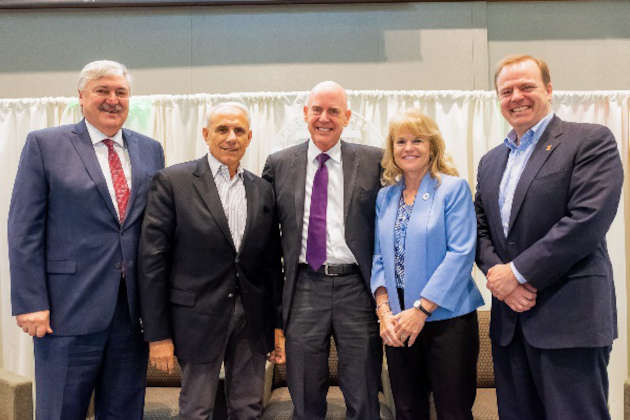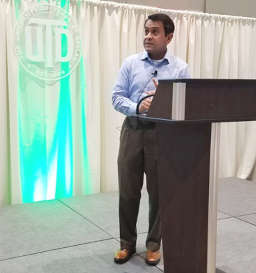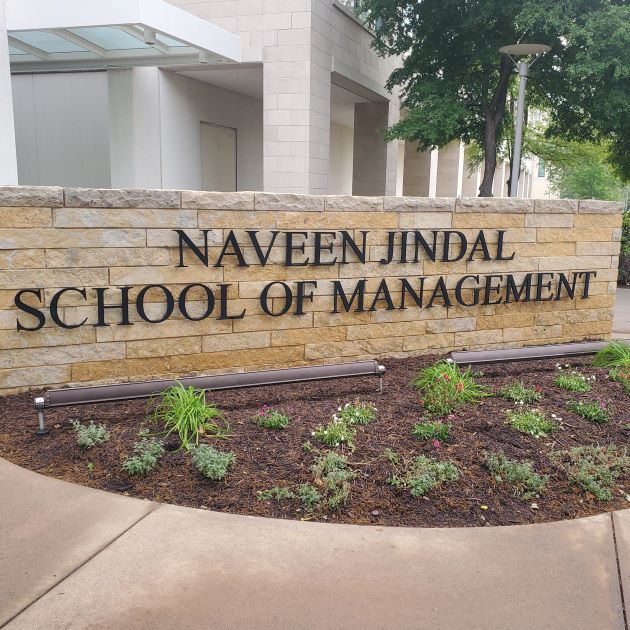The Naveen Jindal School of Management served as the launchpad recently for a space-age themed conference focused on the future of the MBA.
The Jindal School hosted the 25th Annual Part-Time MBA Conference Sept. 30 — Oct. 2 and the concurrent second annual Online MBA Conference Oct. 1 — Oct. 3. Nearly 200 deans, associate and assistant deans, directors, professors, advisors and coordinators from more than 100 management and business schools attended the joint conferences. About half attended both conferences.

Dr. Monica Powell, senior associate dean at the Jindal School, led the planning for both conferences and hosted the gatherings. “With millennials and technology coming in, everything is changing rapidly,” she said. “With artificial intelligence and the way consumers buy — everything in business has been turned on its head, and education has to keep that same pace.”
The 22 concurrent sessions had 53 presenters from 36 universities along with representatives of the Graduate Management Admission Council and MBA News Digest. Each session had space-age titles such as “Houston, We Have a Problem! What Can We Learn from Other Industries Transforming at Warp Speed?” and “Is Your Brand Lost in Space? Amazonification of Your Website.” Presenters covered a galaxy of topics related to adapting MBA programs that are capable of producing graduates who can succeed in industries that must operate, Powell said, in a fast-paced, increasingly complex and ever uncertain world.
Dan Poston, assistant dean of MBA programs at the Michael G. Foster School of Business at the University of Washington, moderated the opening plenary session, “Flash Forward: Busting Barriers for Future PMBA,” a discussion in which deans from four universities performed an impromptu strengths, weaknesses, opportunities and threats —SWOT — analysis of the MBA. They offered their views on what the part-time MBA has been, where it stands now and what they believe will be required for it to succeed in the future.

The panelists were Dr. John Kraft, dean of the University of Florida’s Warrington College of Business; Dr. Jeffrey R. Brown, dean of the University of Illinois Urbana-Champaign’s Gies College of Business; Dr. Joyce E.A. Russell, dean of the Villanova University School of Business; and Dr. Hasan Pirkul, Caruth Chair and dean of the Jindal School. Pirkul filled in for scheduled panelist Dr. Misty Johanson, dean of DePaul University’s Driehaus College of Business and Kellstadt Graduate School of Business, who was ill.
Russell explained that there are two reasons why the MBA has been, and still is, such a valuable tool for business leaders.
“No matter what anybody does, they need business skills — and I think people understand that,” she said.
Whether a student goes into a career in the sciences or healthcare, she said, they still need basic technical and functional skills — accounting, for instance — to run a business. That, and the ability for schools to adapt and teach ever-evolving specialized skills such as cybersecurity along with basic business knowledge, keeps an MBA education relevant.
The panelists also identified several weaknesses, including an overreliance on international students in the face of funding cuts, a lack of gender diversity, rising tuition rates and the risk of reduced collaboration and interaction among students who pursue online MBA programs.
“One of the big pluses of an MBA program are that people learn from each other,” Pirkul said. Solutions such as the right use of technology could help solve this problem in online courses, he said, but “we have to be extremely careful not to lose that aspect of the MBA education.”

Ravin Jesuthasan, managing partner and global practice leader at financial services firm Willis Towers Watson, was the keynote speaker Oct. 2. His presentation, “Future Work and Its Impact on the MBA,” laid out a vision for how MBA programs will need to adapt to prepare graduates for the uncertainties of future workplaces.
Jesuthasan told the audience that legacy — whether in mindset, culture, organizational infrastructure or tool sets — had been the primary source of competitive advantage for companies in the second and third industrial revolutions.
Now, he said, legacy, as exemplified by recent bad news coming from corporate giants such as General Electric and IBM, “is increasingly becoming the millstone that hangs around the neck of our organizations as they look to transform in this fourth industrial revolution. It’s the primary obstacle to them being able to…compete with this new breed of startups.”
To build the leaders of the future, Jesuthasan said, business schools need to pivot from the formal structures of the past to more nimble approaches, such as those recently implemented by Harvard University and the National University of Singapore, that can accommodate the rapid evolution of work.
“Everyone who graduates from [Harvard’s] MBA program,” he said, “has access to unlimited, free continuous learning. … The National University of Singapore has done the exact same thing — this notion of lifelong access as a way of … continued relevance of their graduates.”
Powell summarized the thrust of both conferences at the end of Jesuthasan’s presentation — as well as the challenge that participants soon will be facing:
“You heard it here first,” she said. “In the MBA program of the future, we will have an obligation to teach our students to be secure with being insecure.”






